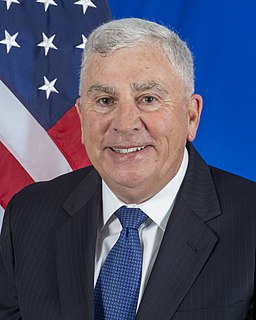A Quote by Safa Al Ahmad
The ironic factor that is between the Houthis and al-Qaida, that is, they both have strong anti-American sentiment. For example, the slogan of the Houthis is death to America and death to Israel and God curse the Jews and victory to Islam. And besides that, there is very little in common between al-Qaida and the Houthis as far as ideology goes, but they see themselves as having a common enemy, which is America. And America is in a situation, where the Houthis are fighting al-Qaida quite viciously on the ground, yet now the Americans are allied with Saudi Arabia in strikes against the Houthis.
Quote Topics
Against
Al
Allied
America
American
Anti
Anti-American
Arabia
As Far As
Besides
Between
Both
Common
Common Enemy
Curse
Death
Enemy
Example
Factor
Far
Fighting
For Example
God
Goes
Ground
Having
Ideology
Ironic
Islam
Israel
Jews
Little
Now
Quite
Saudi
Saudi Arabia
See
Sentiment
Situation
Slogan
Strikes
Strong
Themselves
Very
Victory
Which
Related Quotes
I think what is happening is that Houthis and the Iranians have common interests, but there's very little good journalism that's been done to uncover the true extent of that relationship between the Houthis and Iran. But, obviously, I do think that they - they benefit from the rhetoric of the Houthis on the ground. But, also, they do have a connection, but not to the extent that is being covered in the media at the moment by describing them as a Shia militia backed by Iran. I think that's an overstatement.
The Saudis and Emiratis blame all of this on Iran. I think they’d have to grant, that as has been said, that the Houthis are an internally generated movement in Yemen and the Saudis were supposed to be dealing with the Houthis, who started out in essence along their border. So one of the things that we’re seeing is a complete failure of Saudi policy toward Yemen over the past 10 years, but the Saudis totally believe that the reason the Houthis are able to succeed militarily is the amount of money, advice, and guns they are receiving from Iran.
I don't think he fully analyzes the situation. If you destabilize [Bashar] Assad and punish Assad, you do embolden terrorists. You embolden al-Qaida because al-Qaida is on the other side of this war. So, one side wins if you destabilize the other side. So, he will be emboldening al-Qaida and the Islamic rebels. And I'm not so sure they're better than Assad.
I was the first senior American official to meet with Riyadh's dynamic Deputy Crown Prince Mohammed bin Salman after the Saudi intervention in Yemen in 2015. I reiterated the United States' commitment to defend Saudi Arabia against Houthi aggression and to help press the Houthis back to the bargaining table.
We know definitively that Al-Qaida isn't all over Afghanistan anymore. According to CIA estimates, there are less than a hundred Al-Qaida members in the entire country. Most of them are in Pakistan. So, it's hard for me to understand why we're still fighting there and sending in more and more troops. I would get out of Afghanistan as quickly as possible.































